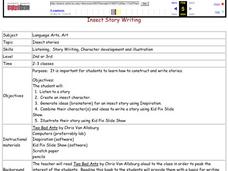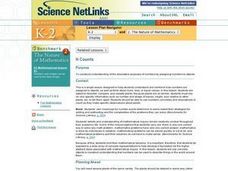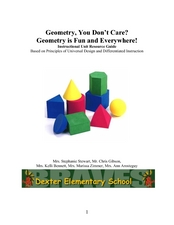Balanced Assessment
Bumpy-Ness
Develop a new measure of the properties of an object. Scholars develop a definition and formula to measure the bumpy-ness of an object. They utilize their formulas to find the property for several spherical objects.
Curated OER
It's Not All Greek to Me
Learners find out the meaning for prefixes used in math vocabulary. By dissecting words used in everyday math, they figure out what the prefix indicates and what the word means. A variety of well-organized worksheets and activities...
Curated OER
Math: Odd Object Out
Students discover how to classify and categorize items by sorting various objects. As they sort the items, they explain how the items are alike. By repeating the sorting procedure several times, students determine there are numerous...
Curated OER
Sorting and Classifying Concrete Objects by Varying Attributes
First graders examine how to sort concrete objects by their attributes. In this sorting lesson plan, 1st graders listen to Gray Rabbit's Odd One Out by Alan Baker, and discuss the actions of the main character. They practice sorting...
Curated OER
The Grouchy Ladybug
Students learn about sorting and classifying objects by size while reading Eric Carle's "The Grouchy Ladybug". In this sorting and classifying lesson, students first listen to and interact with the story. They then look at cut-outs of...
Curated OER
Sorting and Classifying Outdoors
Students use their math skills of sorting and classifying with materials they collect outdoors. In this early childhood math lesson, students participate in a treasure hunt to gather item in nature and categorize their finds.
Curated OER
Classification And Identification
Students explore diagrammatic and taxonomic keys and their application in the marine sciences. They sort and classify objects and organisms based on visual attributes.
Curated OER
It Counts
Learners classify and compare plants using specific information, observations, and numbers. In this mathematical inquiry lesson, students use plant characteristics to describe, compare, and classify them. They attempt to develop a system...
American Statistical Association
A Sweet Task
Candy is always an effective motivator! A fun math activity uses M&M's and Skittles to explore two-way frequency tables and conditional probability. The candy can serve a dual purpose as manipulatives and experimental data.
Curated OER
Relations
Students identify, compare, and analyze shapes and numbers. In this analogies and comparison math instructional activity, students warm up by completing 4 worksheets to familiarize themselves with analogies. In small groups, students are...
Achieve
False Positives
The test may say you have cancer, but sometimes the test is wrong. The provided task asks learners to analyze cancer statistics for a fictitious town. Given the rate of false positives, they interpret the meaning of this value in the...
Curated OER
Polydron Fun
Students investigate nets as they relate to volume and area. In this geometry lesson plan, students use nets as a visual to deepen their understanding of surface area and volume of objects. They make conjectures about different objects...
Curated OER
Zoom Out
Students explore visual perception and how objects change as distance changes. In this distance and vision instructional activity, students practice their scientific inquiry skills. Students practice drawing objects from different points...
Curated OER
How Many People Live in Your Household?
Students create a pictograph showing household size for the class.In this data collection and graphing lesson, the teacher guides students through the creation of a concrete object graph, then students analyze and summarize the results.
Curated OER
Six of One, Half Dozen of the Other
Students explore the garden with all five senses. In this Science lesson plan, students collect specimens from the garden to classify. Students use adjectives to describe the objects collected.
Curated OER
Quadrilateral Explorations-Grade Nine
Ninth graders investigate quadrilaterals. In this geometry lesson, 9th graders examine and classify quadrilaterals using the slope, midpoint and distance formulas. Additionally, students create various quadrilaterals given...
Curated OER
Geometry is Fun and EverywhereGeometry, You Don’t Care? Geometry is Fun and Everywhere
Third graders investigate shapes in our world. In this geometry activity, 3rd graders describe plane and solid shapes and identify angles, solid objects and lines of symmetry. Students use online resources, graphic organizers and conduct...
Curated OER
Measurement
First graders participate in various activities dealing with measurement, length, volume, and temperature. They identify the need for standard units of measure, sort and classify objects, measure distances, and use a thermometer.
Curated OER
From Curiosity Cabinet to Museum Collection
Learners study binomial nomenclature and museum-based research. They create a curiosity box, label the objects in their curiosity box , develop a classification scheme for the objects, and create a database of all objects collected by...
Curated OER
Exploring the Properties of Rectangular Prisms.
Students define properties of rectangular prisms. In this geometry lesson, students identify the relationship between two and three dimensional objects. They use Cabri technology to graph their figures.
Curated OER
Big Bones, Little Bones
Students investigate archeology. In this archeology lesson, students research the process of excavation. Students participate in a mock-excavation and sort objects by physical properties.
Curated OER
Shapes
Students sort objects by shape, size and color. In this math and literacy sorting lesson, students listen to the book Freddy the Fish and the Squash that Goes Squish by Duke Christoffersen. Students work in small groups to sort vegetable...
Curated OER
Cones, Cylinders, Spheres
Students classify polygons by name and shape. For this geometry lesson, students identify the lateral surface of each conic. They differentiate between cones, cylinders and spheres.
Curated OER
What Does It Matter?
Students define matter, the chemical properties of matter, and the physical properties of matter. They name physical and chemical properties of matter (by classifying using a Tree Map). Students determine the mass, volume, and density of...























